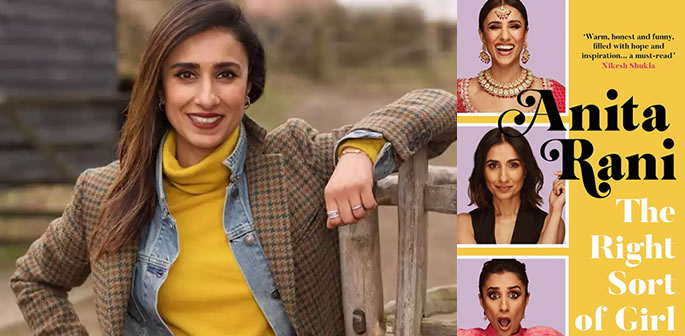“People would shout the ‘P’ word at you"
Anita Rani has released a new book about her life and she said for much of it, she has felt like an outsider.
The TV presenter tried to navigate her Indian culture while trying to blend in with British society.
However, she realised she had morphed into what was expected of her.
She said: “It was the expectations of my family, my culture, the community – and on top of that, you step into another world, like school.
“Maybe I’m just someone who needs to please all the time.
“Within my own culture, there’s a huge weight of expectation, particularly on the girls.”
Anita wrote her memoir, The Right Sort of Girl, during lockdown and it has helped her find her true identity.
She said: “I had time on my hands in lockdown and it was time to put my story out there as an Asian woman who’s achieved a platform and has a voice.
“It was really empowering for me writing it.”
In the memoir, Anita Rani revealed that while growing up, she was called racist names by her white peers.
Anita was also racially abused by her relatives because of her perceived proximity to whiteness, the way she spoke, her taste, her white friends.
She wrote: “In Bradford, in the Eighties, racist slurs were chucked around like tennis balls at Wimbledon.”
Anita enjoyed embracing her Indian culture but she would only do so in Indian situations.
She recalled: “People would shout the ‘P’ word at you sometimes from across the street for no reason.
“You might see it on TV or someone telling a racist joke.
“I had a thick skin and I didn’t see my colour for a long time.”
In her book, Anita said that she self-harmed for a few months during her teenage years when arguments were constant in her house.
“The only time I felt I gained some control over my life and felt some kind of release – felt something – was in those moments when I’d sit in my room and cut myself and watch the blood slowly appear from under my skin.
“Growing up was really tough for me. I was straddling lots of worlds, I was straddling class, and there was a weight of expectation that me and my brother were the new hope.
“I wasn’t going to write about my self-harm, but when I started writing about being a teenager, I felt it was a really important thing to share.
“Sometimes, when you share your own pain, it helps others.”
Although Anita’s mother saw her forearm covered in cuts, her parents did not say anything.
She said: “I don’t think she knew (I was self-harming) – she didn’t know what to say.
Even though cutting myself was a release, it also made me feel great shame.”
Anita Rani was under pressure to marry an Indian and in her memoir, she admitted that she had secret relationships at Leeds University.
After university, Anita moved to London for a BBC placement before joining Channel 5 as a presenter.
Anita had dreams of being the next Oprah Winfrey or Chris Evans.
“They had ownership over their creativity. I used to love watching Oprah and I still do.
“It’s remarkable what she’s achieved, the way she conducts herself and the way she makes everyone feel at ease.
“I loved Chris Evans in TFI Friday and I also watched The Word, all the edgy, anarchic, subversive shows that were shifting culture forward.”
According to Anita, she has had to work harder as an Asian woman.
“I was always going to work hard, but now brilliantly, the landscape is changing.”
“Why wouldn’t we want people from different backgrounds on our screens?
“But 20 years ago, it was very different. Even now, we’re having to push harder.”
Anita revealed that she last heard the ‘P’ word a few years ago in a work situation during a drink with colleagues, who she described as “liberal TV types”.
In her book, she says: “In this present-day work situation, as a full-grown adult in my 40s, all I did was awkwardly laugh it off.
“Why did I do that? I remember feeling pathetic, crushed.”
It questioned her identity but her memoir has helped reflect on her life but feeling like an outsider is in her “DNA”.
She elaborated: “That’s just in my DNA.
“I love being on Woman’s Hour. I’ve finally relaxed.
“It’s such a huge space, even though I only do it on a Friday.
“I feel really happy that I’m representing not just women of colour but a whole generation of people who grew up in the Eighties and Nineties and fought for what we want.”
Anita Rani became the first woman in her family not to have an arranged marriage, tying the knot with technology executive Bhupinder Rehal.
However, for years, she saw marriage as a threat to her career.
“It was not for want of the family trying – I just rejected it.
“There was no decent example of marriage around me. I didn’t really see how marriage was beneficial for women.
“I have remarkable, powerful women all around me who have just put up with their lot.
“I wanted independence, choice and control over my own life.”
She met Bhupinder at a warehouse party in Dalston and a year later, they were married.
On her husband, Anita says:
“He’s free-spirited, he’s living his own life, he’d been travelling for a year, he had a big record collection – and we had similar values.
“I just thought, this is somebody I could build a life with. He’s gorgeous, kind and gentle.
“He just astounded me, because he was soft, kind and vulnerable, which intrigued me.”






























































